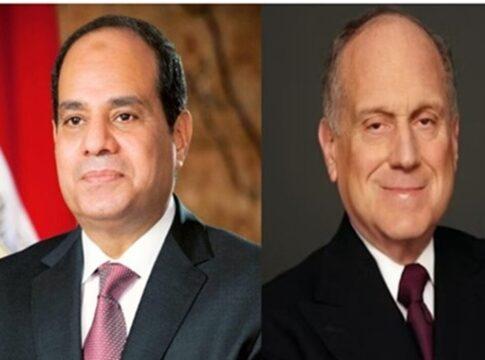President Abdel Fattah El-Sisi met with Ronald S. Lauder, President of the World Jewish Congress, to discuss pivotal issues concerning peace and stability in the Middle East. The meeting was also attended by Mr. Hassan Rashad, Head of the General Intelligence Service.
Ambassador Mohamed El-Shennawy, the Spokesman for the Presidency, conveyed that discussions centered on Egypt’s efforts to uphold the ceasefire in the Gaza Strip, facilitating humanitarian aid, and managing the exchange of hostages. Mr. Lauder commended Egypt’s steadfast commitment to regional stability.
President El-Sisi emphasized the critical importance of all parties fulfilling their commitments to maintain the ceasefire, warning that any continuation or escalation of conflict would be detrimental to all involved. He reiterated Egypt’s stance that establishing an independent Palestinian State with East Jerusalem as its capital, based on the June 4, 1967 borders, is essential for lasting peace.
In light of the ongoing challenges, President El-Sisi outlined Egypt’s comprehensive plan for the reconstruction of Gaza, firmly opposing any forced displacement of its residents. Mr. Lauder echoed support for Egypt’s initiatives, highlighting the country’s pivotal role in the Middle East peace process.

Following the meeting, Mr. Lauder praised the discussions with President El-Sisi, describing them as productive. He emphasized the importance of Egyptian-American relations for regional stability and expressed anticipation for the Egyptian-Arab proposal regarding Gaza. “Peace can only be achieved through a two-state solution,” Mr. Lauder stated, reinforcing the global consensus on the issue.
Experts note that Egypt’s diplomatic efforts are crucial, with the country’s mediation often seen as a potential catalyst for peace. According to the International Crisis Group, without Egypt’s involvement, achieving a sustainable resolution in Gaza would face significant hurdles.
As Egypt continues to champion peace in the region, this meeting underscores its influential role as a mediator and stabilizer, with global stakeholders recognizing its vital contributions to the Middle Eastern peace process.


